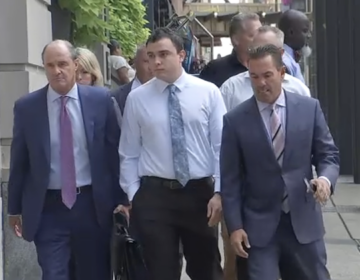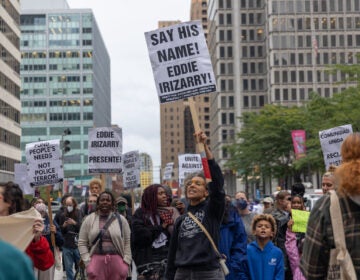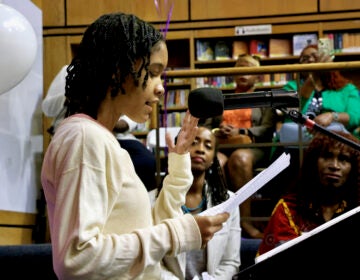1 year later, Eddie Irizarry is remembered in poetry
On Aug. 14, the anniversary of his shooting by Philadelphia police, an anthology of poetry about police violence is published.
Listen 1:45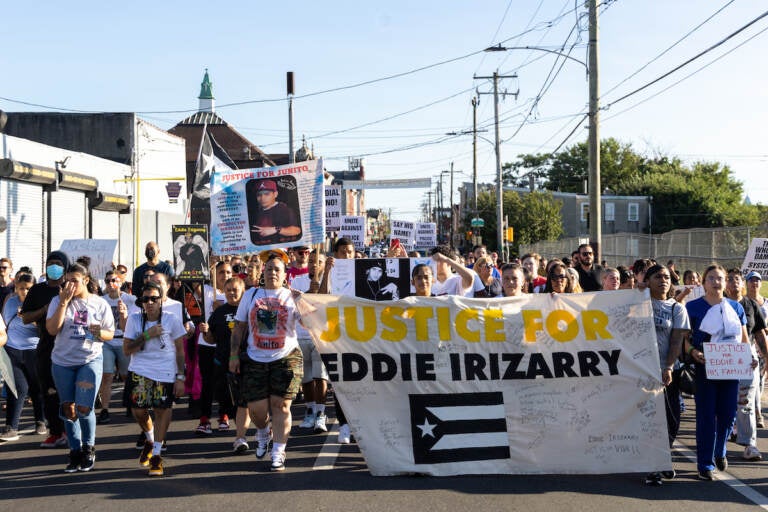
The Kensington community joined the family of Eddie ''Junito'' Irizarry Jr. in a march on August 31, 2023 from the Taller Puertorriqueño cultural center to the Philadelphia Police 24th District headquarters. They demanded the release of body cam footage of Officer Mark Dial, who shot and killed the 27-year-old, and for Dial to be charged with murder. (Kimberly Paynter/WHYY)
From Philly and the Pa. suburbs to South Jersey and Delaware, what would you like WHYY News to cover? Let us know!
On the one-year anniversary of the killing of Eddie Irizarry by former Philadelphia police officer Mark Dial, an anthology of poems is being released about that shooting and many other examples of death by police force.
“Fatal Force: Poetic Justice,” released by Philadelphia’s Moonstone Press, includes over 100 poems by 92 writers. The hard-copy book is having a launch event at Taller Puertorriqueño on Wednesday night. Local editors and a handful of contributing writers will join, some remotely.
The impetus for “Fatal Force” is the poem “Officer Mark Dial, Who Shot Eddie Irizarry, Will Be Fired for Insubordination” by Martín Espada, previously published in North American Review.. Espada used the headline from an Aug. 23, 2023 article in the Philadelphia Inquirer as the title. He chose that headline out of the many written in the wake of Irizarry’s killing because he says it shows a systemic problem with police accountability.
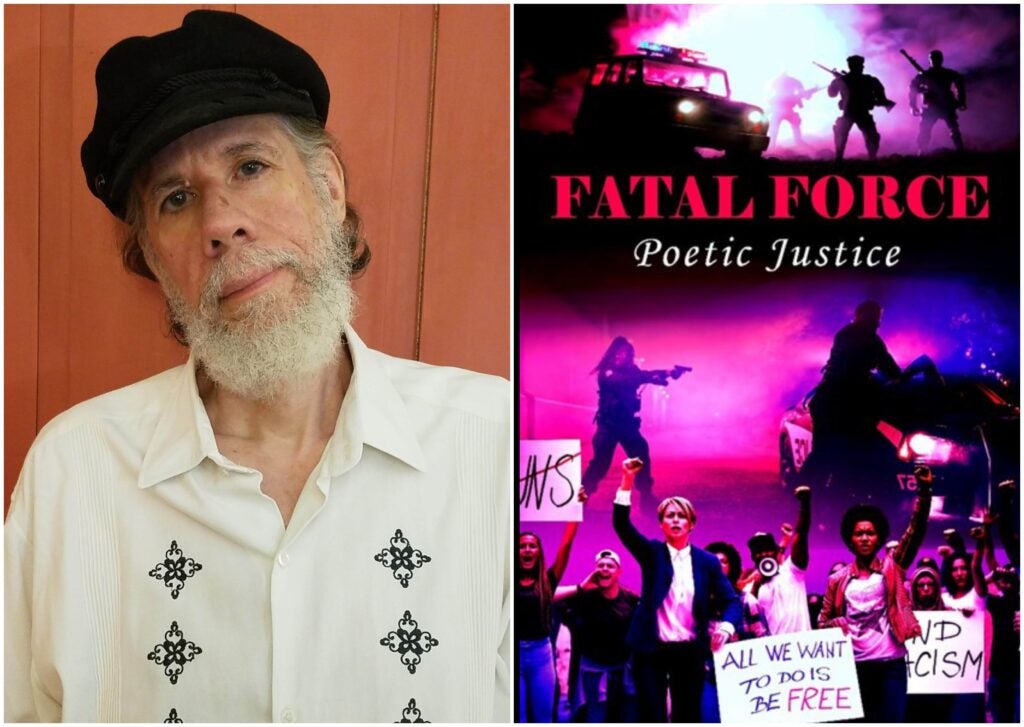
“He was being fired for not cooperating with the police investigation into the shooting,” he said. “He was not being fired for the homicide itself.”
Espada then explained himself by reciting an excerpt of his own poem, written in prose.
The police chief in her white uniform announces that Officer Mark Dial,
who shot Eddie Irizarry, will be fired for insubordination, now that he
is silent as the horn in Eddie’s car, now that he is silent as Eddie. The
words ‘jail’ and ‘murder’ do not drift from her mouth to tap the ceiling at
the press conference.
A year later, the killing of Eddie Irizarry remains headline news. Last week, the Mark Dial trial was complicated by the prosecutor’s failure to share an expert witness testimony with the defense. The first-degree murder charge has been reduced to third-degree, and the trial is delayed.
Much of Espada’s poem is based on visual evidence captured by doorbell video footage, which contradicted the police department’s initial false claim that Irizarry lunged at officers with a knife.
“That was really disturbing. I had to watch it over and over and over,” Espada said. “I had to watch Dial get out of the car. I had to watch him fire those shots. I had to watch them drag the body out of the car. I did it because I have a story to tell. I am acting on behalf of this community as an advocate speaking on behalf of those who do not have an opportunity to be heard.”
Espada sent the poem to Larry Robin, the don of Philadelphia poetry who owned the former Robin’s Books and founded the poetry project Moonstone Arts. Robin turned to David Acosta, director of Casa de Duende, a Philadelphia arts presenter. They decided that simply publishing the piece was not enough.
“He wanted the poem to be more than just a poem,” Acosta said. “One of the duties of the poet is to witness. Poets and poetry have always been used to shed light on issues of importance, and doing so in a way that people can gain new perspectives.”
Acosta used Espada’s poem as a starting point, putting out an open call to poets to contribute works about victims of police violence. In addition to pieces about Irizarry and the use of police force generally, the collection of poems includes at least 18 names of people killed by police.
Many readers are likely familiar with some of the names: Breonna Taylor, Michael Brown, Ahmaud Arbery and Eric Garner.
They also include names some readers may not recognize: Felani Khatun, a 15-year-old Bangladeshi girl who was shot and killed by Indian border security in 2011; Eleanor Bumpurs, an elderly, disabled Black woman killed by police during an eviction from her New York City apartment in 1984; and Mohamud Mohammed Hassan, a British-Somali man who in 2021 died of injuries sustained during a an assault while in police custody in South Wales.
Espada, 67, has spent a lifelong career as a poet and attorney addressing social justice issues. His 2021 book of poems “Floaters” won the National Book Award. It gets its title from the name Border Patrol officers colloquially give to immigrants who drown while trying to cross the Rio Grande.
Espada has little direct connection with Philadelphia. Born in Brooklyn to a father who was a photographer and major figure in Puerto Rican activism, Espada is now based in Massachusetts, where he teaches at Amherst College.
Aside from occasional appearances at Taller Puertorriqueño, an ongoing professional relationship with Larry Robin and a long-ago appearance on the WHYY radio program “Fresh Air With Terry Gross” in 1993, Espada’s connection to Philadelphia had been limited — until he read about Eddie Irizarry.
“What drew me to this particular case — aside from the fact he was Puerto Rican and I’m Puerto Rican — is simply this: story,” he said. “Who tells the story? Who gets to tell the story of your life and death? Do you tell your own story? Does your community get to tell their story, or does somebody else tell the story, and in telling the story changes the story fundamentally?”
A local poet whose work is included in the anthology is Raheem Curry, who had the idea for his poem “The Scramble for Black Identity and Psyche” already in mind when he heard of the open call. The opportunity prompted him to finish it.
His poem takes place in Kensington, the same neighborhood where Irizarry was killed. But “The Scramble” is Curry’s own story: His brother was assaulted by police inside his mother’s home when a SWAT team raided the wrong house.
The way Curry describes it, police were on the block searching for a known and violent criminal. His brother spotted them from the porch and moved inside for safety. Police misinterpreted his movement and attacked.
“I guess the SWAT team thought he was running from them,” Curry said. “When the cops got in they bashed his head against the wall. They put infrared on my brothers and his friends.”
Curry writes in the poem that, once police understood their mistake, they treated it like a joke.
They laughed at the victims.
Telling the young men,
“This is an experience that
May get you women at a bar”
Curry ends the poem with a question: “When will they learn that we were never expendable?”
“One of my big influences James Baldwin, and one of my favorite quotes by him is that the role of a poet is to make the world a more human, dwelling place,” Curry said. “Hopefully this anthology does that, to see that these people who are affected by injustices, police brutality, this isn’t a human dwelling place for us all.”
“Fatal Force” was developed rapidly, moving from concept to call for submissions, through editing to print in less than a year. The publishers wanted to get the poetry in the hands of readers before the story of Eddie Irizarry faded from the headlines.
“Poets can, and should, act as journalists. Poets can, and should, act as historians. Poets can, and should, act as advocates,” Espada said. “You asked me before, ‘Why did I write about this?’ Well, it’s as natural as breathing.”
“Fatal Force” is a limited print run of a few hundred copies. Acosta said more copies can be printed to accommodate demand.
Proceeds from the sale of the anthology will go into a fund in Eddie Irizarry’s name. Moonstone Arts will consult with the Irizarry family to decide how to distribute the funds.

Get daily updates from WHYY News!
WHYY is your source for fact-based, in-depth journalism and information. As a nonprofit organization, we rely on financial support from readers like you. Please give today.



